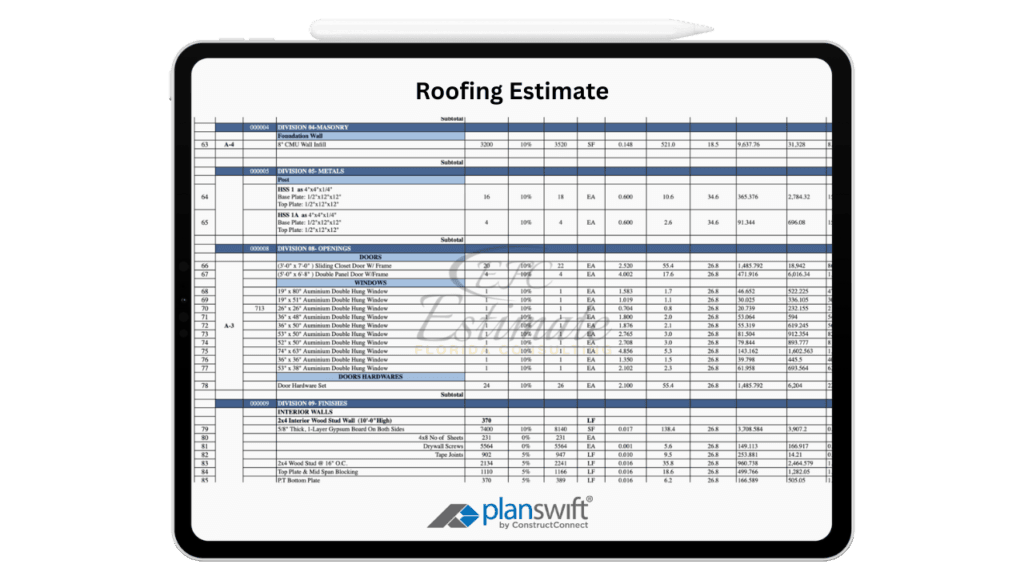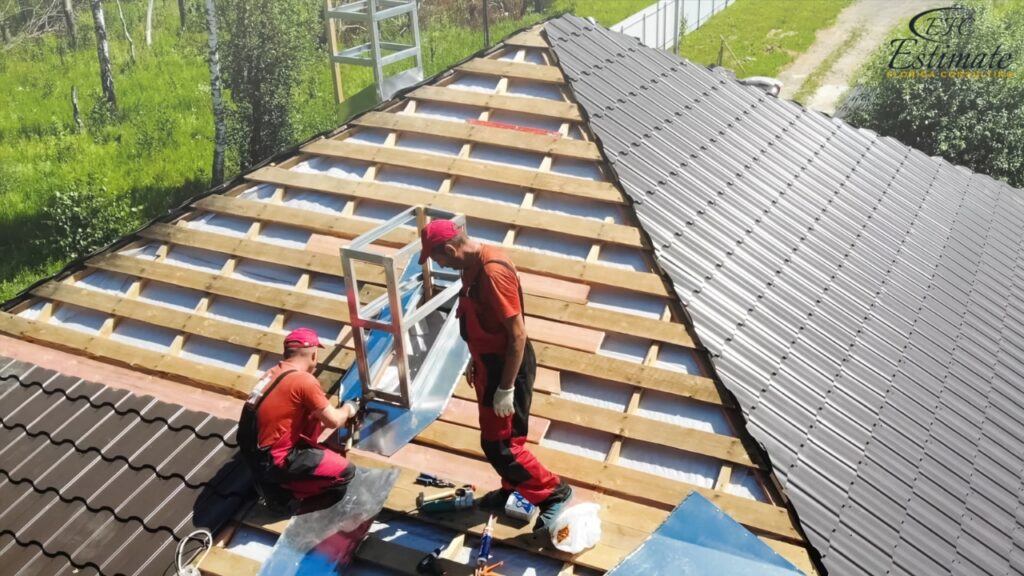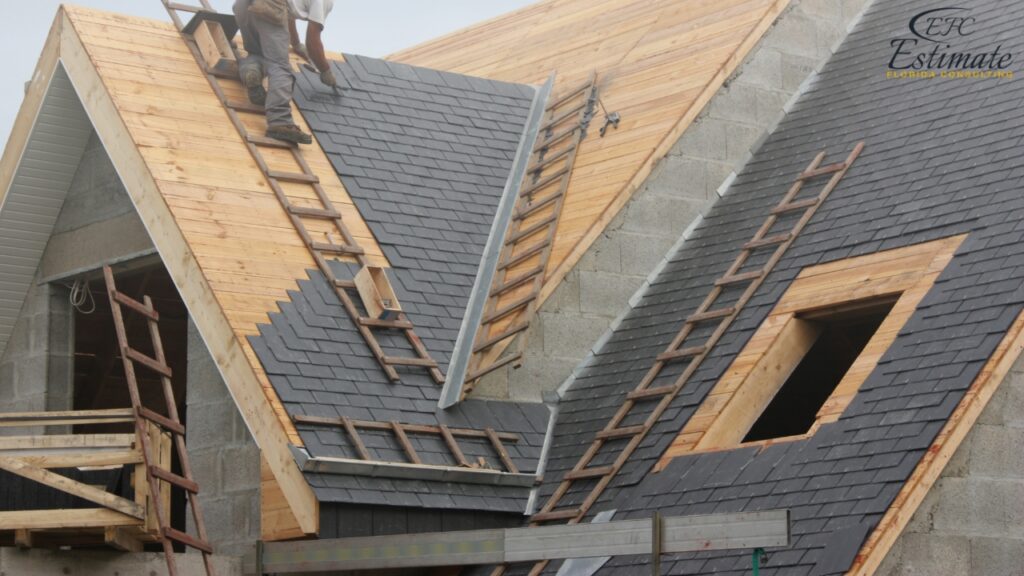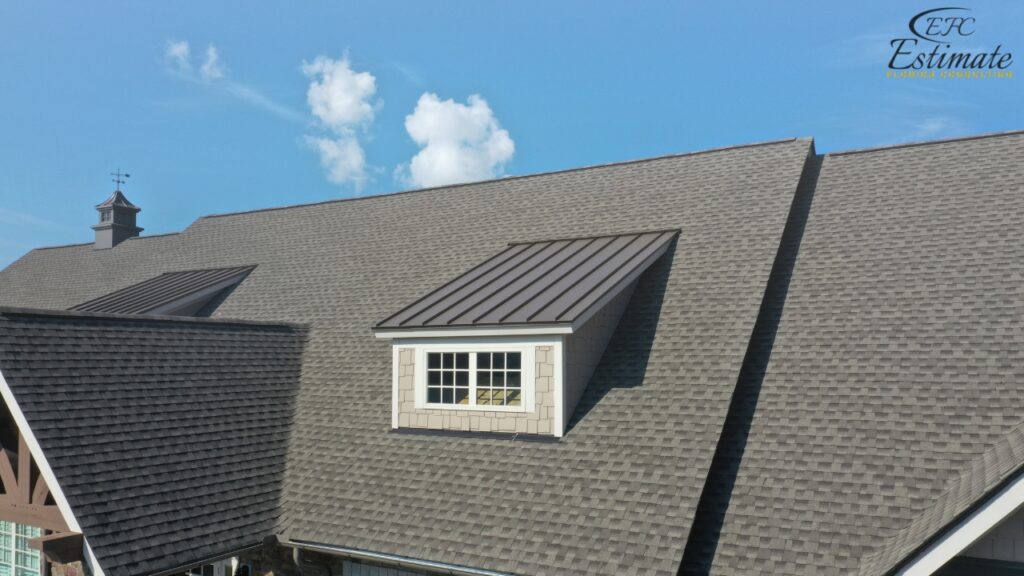90% More Chances to Win Projects With Our Estimate!
- Multi-Family Building
- Hotel Building
- Hospital Building
- Warehouse Building
- School & University Building
- High-Rise Building
- Shopping Complex
- Data Center Building

Choosing the right roofing material is essential for long-term durability, energy efficiency, and aesthetics. Roofing material costs vary based on the type of material, its durability, and installation requirements. For homeowners and contractors in Florida, understanding these costs helps in making informed decisions that balance budget considerations with quality and durability. In this guide, we’ll explore the costs of various roofing materials, installation expenses, maintenance requirements, and additional factors that can impact the overall budget of a roofing project.

Below is a comparison table summarizing the average cost per square foot for each roofing material, providing a clear overview for budgeting purposes.
Roofing Material | Average Cost per Square Foot |
Asphalt Shingles | $3 – $5 |
Metal Roofing | $9 – $15 |
Tile Roofing | $10 – $20 |
Slate Roofing | $20 – $40 |
Wood Shakes | $8 – $12 |
Each material has distinct characteristics, and the choice often depends on factors like climate, aesthetic preferences, and long-term maintenance considerations.
Asphalt shingles are one of the most popular roofing materials for residential projects due to their affordability and ease of installation. Asphalt shingles generally cost between $100 and $200 per square (100 sq. ft.) for standard options, with higher-end architectural shingles ranging up to $300 per square. Asphalt shingles are available in various colors and styles, making them versatile for aesthetic purposes but generally have a lifespan of 15-30 years.
Metal roofing is a durable and energy-efficient option that is increasingly popular in Florida due to its ability to withstand extreme weather conditions. Metal roofs can range in cost from $300 to $600 per square for basic styles, while more decorative metal roofs, such as standing seam, can reach $900 per square. Metal roofing typically lasts 40-70 years, making it a solid long-term investment despite the higher upfront cost.
Tile roofing is known for its longevity and aesthetic appeal, commonly used on Mediterranean or Spanish-style homes. Costs for tile roofing materials range from $400 to $700 per square for concrete tiles and $700 to $1,200 per square for clay tiles. Tile roofs can last over 50 years with proper maintenance but are heavier than other materials and may require reinforced roof structures.
Wood shake roofing offers a natural look that enhances the appearance of rustic or traditional-style homes. Wood shakes typically cost between $400 and $700 per square. This roofing material requires regular maintenance to prevent issues like rot and insect infestation, especially in humid climates, and has an average lifespan of 20-40 years.
Slate roofing is one of the most durable and premium options available, often chosen for its natural beauty and long lifespan. Slate roofs can range from $1,000 to $2,000 per square, making it one of the more costly options but with a lifespan that can exceed 100 years. Due to its weight and cost, slate is typically used in high-end construction or historic renovations.

For residential roofing projects, the choice of material will significantly influence overall costs. Below is a cost table illustrating the typical costs of popular residential roofing materials:
Material Type | Average Cost per Square (100 sq. ft.) | Lifespan |
Asphalt Shingles | $120 – $240 | 15 – 30 years |
Metal Roofing | $360 – $720 | 40 – 70 years |
Concrete Tile | $480 – $840 | 50+ years |
Wood Shake | $480 – $840 | 20 – 40 years |
Slate Roofing | $1,200 – $2,400 | 75+ years |
The cost table above provides a breakdown of residential roofing materials, highlighting the cost per square and expected lifespan. For homeowners in Florida, choosing materials that withstand high winds, salt air, and sunlight is crucial, often justifying the higher costs for durable options.
Commercial roofing typically involves materials with specific durability and weather-resistant properties suited to large, flat roofs. Common materials include TPO (Thermoplastic Polyolefin), EPDM (Ethylene Propylene Diene Monomer), and built-up roofing (BUR).
Material Type | Average Cost per Square | Lifespan |
TPO | $350 – $600 | 15 – 20 years |
EPDM | $300 – $500 | 15 – 25 years |
Built-Up Roofing | $350 – $600 | 15 – 30 years |
Metal Roofing | $400 – $750 | 40 – 70 years |
Commercial projects often prioritize materials based on durability and maintenance needs. TPO and EPDM are cost-effective solutions for flat roofs, offering flexibility and weather resistance, while metal roofing is favored for its longevity.

The pitch or slope of a roof affects material costs due to increased labor and safety equipment required for steep angles. Steeper roofs increase both material usage and installation time, typically resulting in higher overall costs.
Roof Slope | Cost Increase (%) |
Low (1/12 – 3/12) | Base Cost |
Medium (4/12 – 6/12) | +10 – 15% |
High (7/12 – 9/12) | +20 – 30% |
Very Steep (10/12+) | +30 – 50% |
The table above highlights typical cost increases based on roof pitch. Steeper slopes require more skill and additional safety measures, impacting both material and labor costs.
Replacing an existing roof often involves additional labor for removing the old material and inspecting the structure. New roofing projects may also require permits and disposal costs, depending on local regulations.
Project Type | Average Cost per Square |
New Roof | $300 – $600 |
Roof Replacement | $400 – $800 |
Roof replacement costs tend to be higher than new roof installations due to the added labor and disposal fees associated with tearing down old materials.
Each component of the roofing system plays a role in total project costs. Below are details and average costs for the main roofing components:
Underlayment provides a water-resistant layer between the roof deck and roofing material. Options include felt and synthetic underlayment, with synthetic underlayments generally costing more but offering greater durability.
Underlayment Type | Average Cost per Square |
Felt Underlayment | $30 – $50 |
Synthetic Underlayment | $50 – $100 |
Roof decking, or sheathing, provides the foundational structure for the roof. Plywood and OSB are common choices, with costs affected by thickness and moisture resistance.
Decking Material | Average Cost per Square |
Plywood | $100 – $150 |
OSB | $80 – $130 |

Insulation helps maintain energy efficiency and climate control. Adding insulation can increase roof installation costs but provides energy savings.
Insulation Type | Average Cost per Square |
Fiberglass | $80 – $120 |
Roof insulation is essential for energy efficiency, especially in extreme climates. Insulating a roof can cost between $1,000 to $5,000 depending on the size and type of insulation used. Proper insulation reduces heating and cooling costs, contributing to lower utility bills and increased comfort.
Proper ventilation prevents moisture buildup and extends the roof’s lifespan. The cost of installing ventilation systems ranges from $300 to $1,500 based on the roof’s size and the type of ventilation system chosen.
Solar panels are a sustainable addition to roofing projects, providing renewable energy and reducing electricity costs. Installation costs for solar panels range from $10,000 to $30,000, depending on the number of panels and system size. While the upfront cost is substantial, homeowners can benefit from energy savings and potential tax incentives.

The right roofing material is crucial for balancing cost, durability, and energy efficiency, especially in Florida’s climate. With options like asphalt shingles, metal, tile, wood shakes, and slate, each material brings unique benefits and costs. Understanding factors like roof pitch, material lifespan, and component costs helps homeowners and contractors make informed decisions suited to their budget and project needs. Whether for residential or commercial properties, investing in high-quality materials and considering additional features like insulation, ventilation, and even solar panels can enhance longevity, reduce energy bills, and offer greater overall value.
Roofing material costs vary based on the type of material, its durability, aesthetic appeal, and specific installation requirements. Factors like roof pitch, building size, local climate, and additional features, such as ventilation and insulation, also impact the final cost.
In Florida, materials with high wind resistance, moisture control, and UV protection are ideal. Metal, tile, and slate are popular for their durability and resilience in extreme weather, while asphalt shingles are budget-friendly but may require more maintenance over time.
Costs range widely: asphalt shingles average $3–$5 per sq. ft., metal roofing $9–$15 per sq. ft., and slate roofing can reach $20–$40 per sq. ft. Each material offers different benefits, so budget and longevity should guide your choice.
The pitch or slope of a roof impacts costs due to labor intensity and safety requirements. Steeper roofs require more material and labor, often increasing costs by 10-50% depending on the slope's angle.
Solar panels can be a valuable addition, providing renewable energy and reducing electricity costs. Installation costs range from $10,000 to $30,000, but long-term energy savings and tax incentives may offset initial expenses.
Yes, replacing a roof typically costs more due to the labor involved in removing old materials, disposing of waste, and potential structural repairs. New roof installations are generally less costly but may involve extra fees for permits and inspections.
Underlayment and decking are essential layers for roof stability and water resistance. Felt underlayment averages $30–$50 per square, while synthetic options can cost up to $100 per square. Decking costs range from $80 to $150 per square, depending on material and thickness.
Lifespan varies by material: asphalt shingles last around 15-30 years, metal roofing 40-70 years, tile roofing 50+ years, and slate can exceed 75 years. Materials like slate and metal, while costlier, offer longer-term durability.
Insulation and ventilation add to upfront costs but can reduce energy bills and extend the roof's lifespan. Roof insulation typically costs between $1,000–$5,000 depending on the area, while ventilation systems range from $300–$1,500.
At Estimate Florida Consulting, we offer detailed cost estimates across all major trades, ensuring no part of your project is overlooked. From the foundation to the finishing touches, our trade-specific estimates provide you with a complete and accurate breakdown of costs for any type of construction project.

We take pride in delivering accurate, timely, and reliable estimates that help contractors and builders win more projects. Our clients consistently praise our attention to detail, fast turnaround times, and the positive impact our estimates have on their businesses.
Estimate Florida Consulting has helped us win more bids with their fast and accurate estimates. We trust them for every project!

Submit your project plans, blueprints, or relevant documents through our online form or via email.
We’ll review your project details and send you a quote based on your scope and requirements.
Confirm the details and finalize any adjustments to ensure the estimate meets your project needs.
Receive your detailed, trade-specific estimate within 1-2 business days, ready for your project execution.

561-530-2845
info@estimatorflorida.com
Address
5245 Wiles Rd Apt 3-102 St. Pete Beach, FL 33073 United States
561-530-2845
info@estimatorflorida.com
Address
5245 Wiles Rd Apt 3-102 St. Pete Beach, FL 33073 United States
All copyright © Reserved | Designed By V Marketing Media | Disclaimer